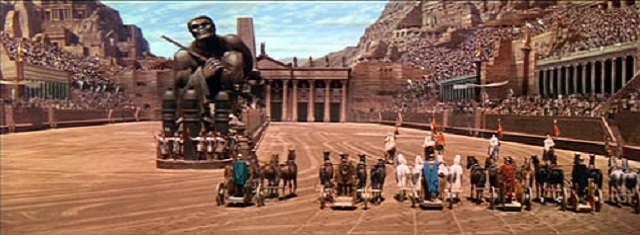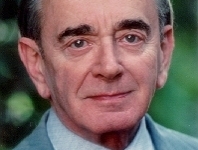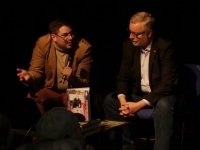Entertainment
The Hungarian with 3 Oscar Awards
World-famous Hollywood music composer

USPA NEWS -
The Hungarian Hollywood Council commemorated the 110. anniversary of the birth of Miklós Rózsa, the world-famous Hollywood music composer.Rózsa was most famous for his Hollywood and British film scores.
Rozsa's music is steeped in post-romanticism, with stylistic roots in the folk music of his native Hungary and some slight influences from those two giants of 20th-century Hungarian music, Bela Bartok and Zoltan Kodaly. Rózsa was born in the 6th District of Budapest, so the Eötvös10 Cultural Center hosted the event. Miklos Rozsa spent his boyhood summers on his father's country estate, where he first encountered the peasantry of the surrounding villages, and began absorbing all he could of their music. He began playing the violin at age five, and later studied the viola and the piano, and made his public performing debut at age seven.
Ambassador Balázs Bokor, President of the Council introduced the Hungarian roots of Hollywood with a powerpoint lecture to the full house of the event. He spoke about Adolph Zukor, founder of the Paramount Pictures and William Fox, founder of the 20th century Fox, both born in Hungary. He underlined that until now 39 Oscar Awards were won by people of Hungarian origin. Gergely Hubai, a filmmusic expert delivered a lecture on the life and works of Miklós Rózsa. In his detailed and interesting lecture he demonstrated the results of Rózsa from period to period with special extracts of music from various films.
The senstaion of the evening was the improvization of Béla Szakcsi Lakatos, the Artist of the Nation, a Kossuth and Liszt Award winner composer and pianist on the music of Rózsa. It was a unique and music-historical happening. The audience reacted to Szakcsi`s art with a standing ovation. Rózsa composed the music of more then 100 films. He got the Oscar for the Spellbound, the Double Life and the Ben Hur, but The Thief of Bagdad, the Julius Ceasar, the Jungle Book, the Tarzan, the Quo Vadis, the Ivanhoe, the Madame Bovary and a lot more were films with his excellent music.
In 1953, the famed violinist Jascha Heifetz, having seen some of Rozsa's sketches for a proposed violin concerto, commissioned the piece from Rozsa -- it was premiered in 1956 and recorded the same year on RCA. The Violin Concerto proved an enduringly popular work, and its success led to the 1961 joint commission from Heifetz and his equally famous colleague, cellist Gregor Piatigorsky, for a piece utilizing violin and cello, the Sinfonia Concertante.
Despite the onset of advancing age and a debilitating stroke, which combined to end his career in the concert hall, Rozsa retained an active interest in all of his music into the 1990s. He assisted in the recordings of new versions of his orchestral works by conductor James Sedares on the Koch International label in the 1990s, and even resurrected such works as the Symphony in Three Movements, which he withdrew from publication in 1930.
More post-romantic than modernist, Rozsa's music is tonal and melodic, often achingly so, and his work at its most accessible -- which is nearly all of it -- recalls the music of Dvorak, Janacek, and Respighi, although it is drawn from Hungarian sources, rather than Czech or Italian roots. And despite his post-romantic and nationalistic leanings, Rozsa's work was also characterized by an almost classical-era restraint, economy, and discipline, which makes it eminently more listenable than the serious work of most of his Hollywood contemporaries (Bernard Herrmann comes to mind), who seldom understood the notion of restraint.
His work could bring recollections of pre-World War I Budapest alive; lift the rhythms, harmonies, and melodies of Hungarian folk music to symphonic heights; or, on the screen, express the myriad emotions behind human behavior, from cold-blooded murder in The Killers to the teachings of Jesus in Ben-Hur. He was devoted to his homeland and his native culture until the last minute of his life. He died in Los Angeles on 27 July 1995. Rozsa was the most successful of his generation of film composers at balancing his movie and concert work.
The Rózsa memorial event proved again that there is a growing need to keep the memory of the Hungarian born film celebrities and show their example to young generations. Therefore, the activity of the Hungarian Hollywood Council should be spread more and more. The Hungarian Hollywood Council commemorated the 110. anniversary of the birth of Miklós Rózsa, the world-famous Hollywood music composer.
Liability for this article lies with the author, who also holds the copyright. Editorial content from USPA may be quoted on other websites as long as the quote comprises no more than 5% of the entire text, is marked as such and the source is named (via hyperlink).







